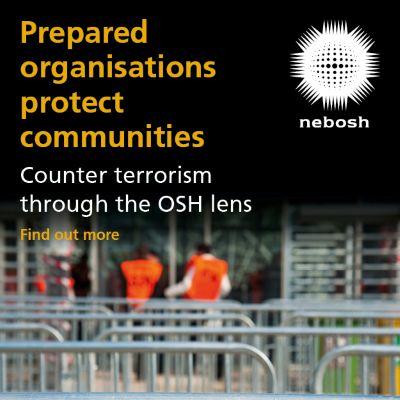NEBOSH launches new qualifications to help organisations protect people and communities from terrorism threats
Thursday, 27 November 2025
NEBOSH, the National Examination Board in Occupational Safety and Health, has launched three new qualifications designed to help organisations counter terrorist threats and, in the UK, prepare for new legislation.

The UK’s new Terrorism (Protection of Premises) Act 2025, also known as “Martyn’s Law”, will place legal duties on certain public premises to consider terrorist threats, take steps to protect against potential attacks, and keep people safe should an incident occur. NEBOSH’s new qualifications will equip responsible individuals with the knowledge and skills needed to help protect people from terrorist threats. The addition of an international qualification will help ensure a comprehensive approach to counter-terrorism preparedness worldwide.
The qualifications are:
- NEBOSH National Certificate in Protecting Standard Duty Premises from Terrorism
A one-day course for those managing publicly accessible premises where between 200 and 799 people may be present at the same time. - NEBOSH National Certificate in Protecting Enhanced Duty Premises and Events from Terrorism
A three-day course for those managing publicly accessible premises and events where between 800 or more people may be present at the same time. - NEBOSH International Certificate in Protecting Premises and Events from Terrorism
A three-day course for those who are involved in ensuring that that their organisation has considered and addressed the threat of terrorism in premises and events open to the public.
Participants will learn to understand the nature of terrorism, assess potential terrorism threats, identify protective procedures and measures and the appropriate emergency response. The courses also cover risk assessments, investigations and security culture.
Matt Powell-Howard, NEBOSH Director of Product Development, added: “At the heart of these qualifications is a commitment to protecting lives. Families, friends and colleagues’ safety and wellbeing depend on effective preparation and response. For health and safety professionals, many of the principles we know about risk assessment and control will help us contribute to organisational counter-terrorism preparedness, and these qualifications are a great way to learn how to apply those skills in a security context.”
Rhian Greaves, Partner Regulatory – Safety, Health & Environment at DAC Beachcroft, said: “Martyn’s Law positions the UK as a leader in counterterrorism by requiring a consistent approach to terrorism preparedness. It clarifies who is responsible at qualifying premises and events and what they must do. It calls for clear risk understanding, consistent practices, and strong collaboration to foster a safety-focused culture.”
For further information, visit: www.nebosh.org.uk/counterterrorism
